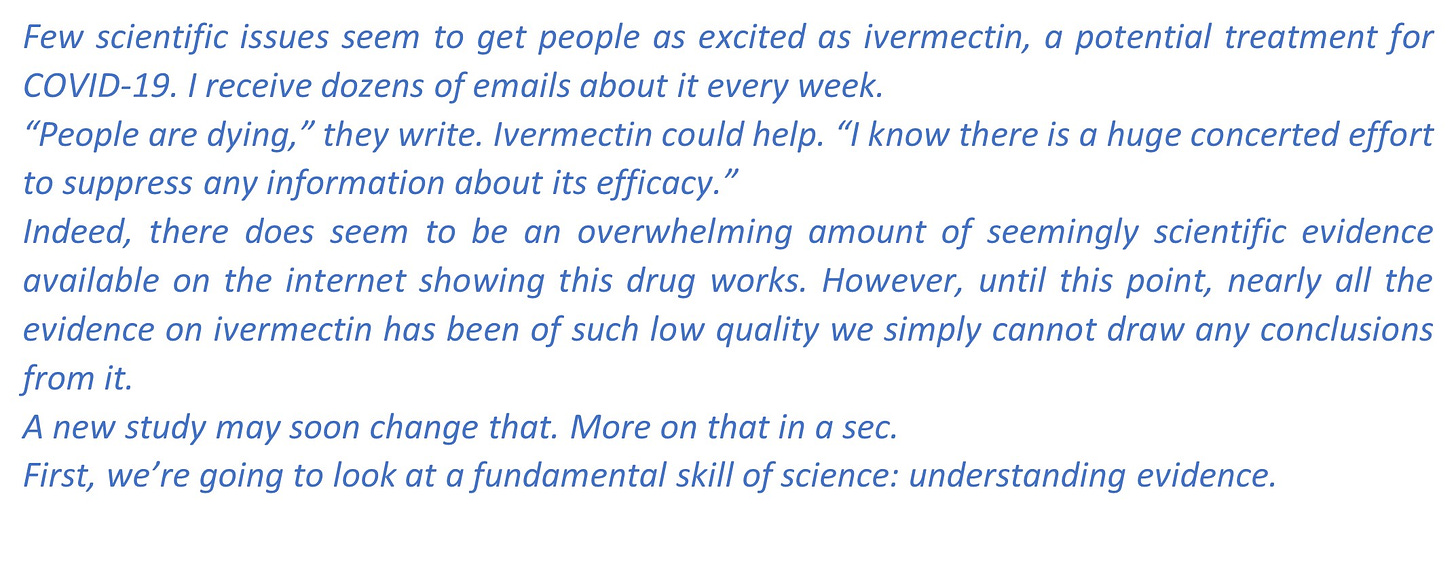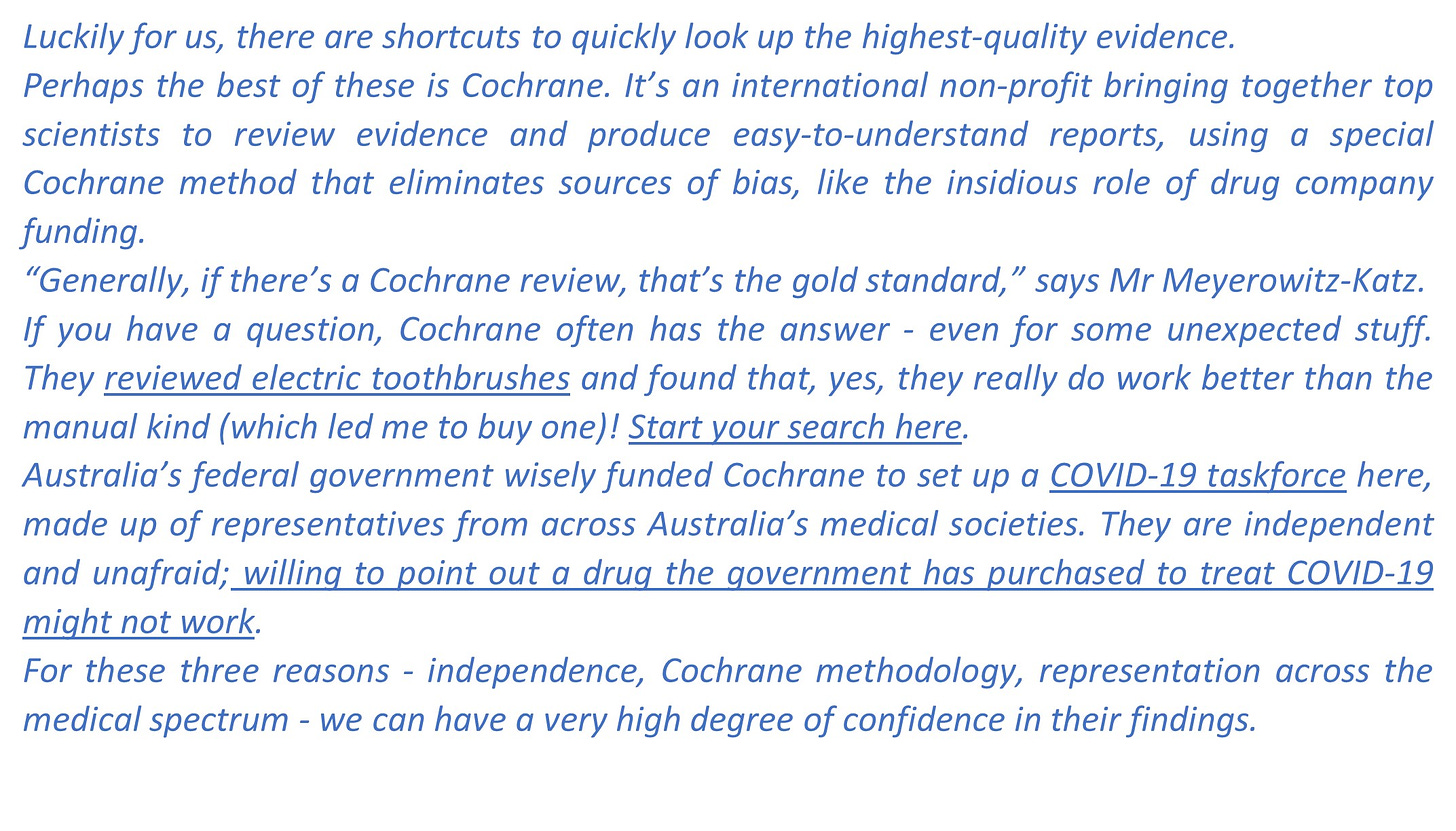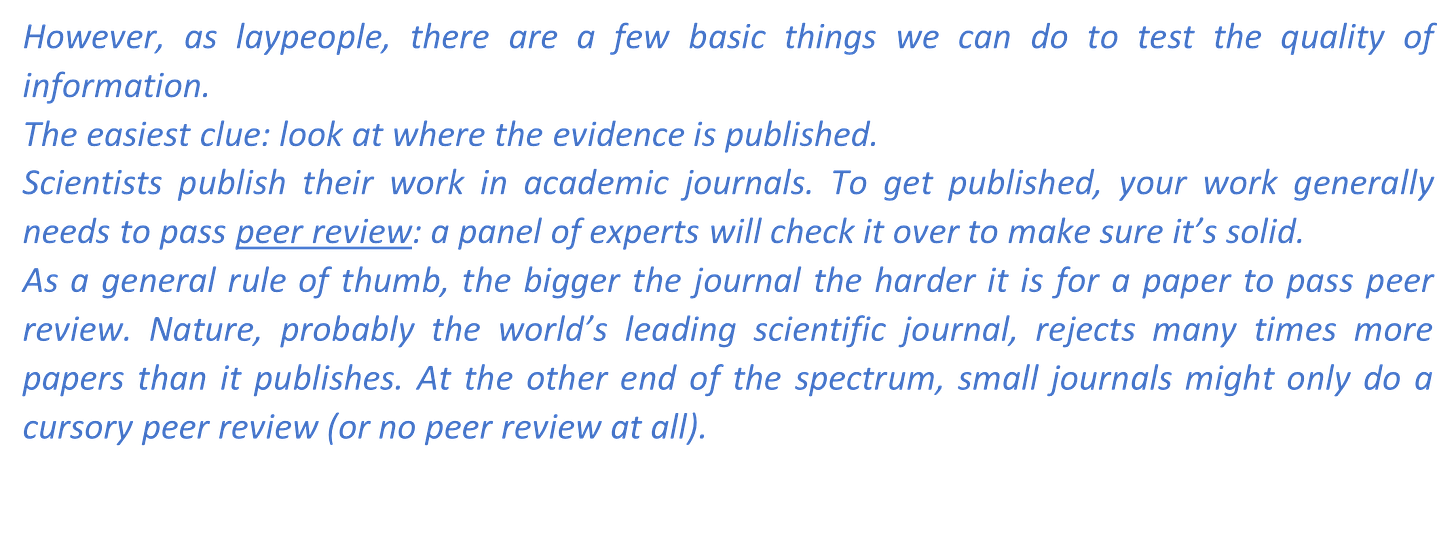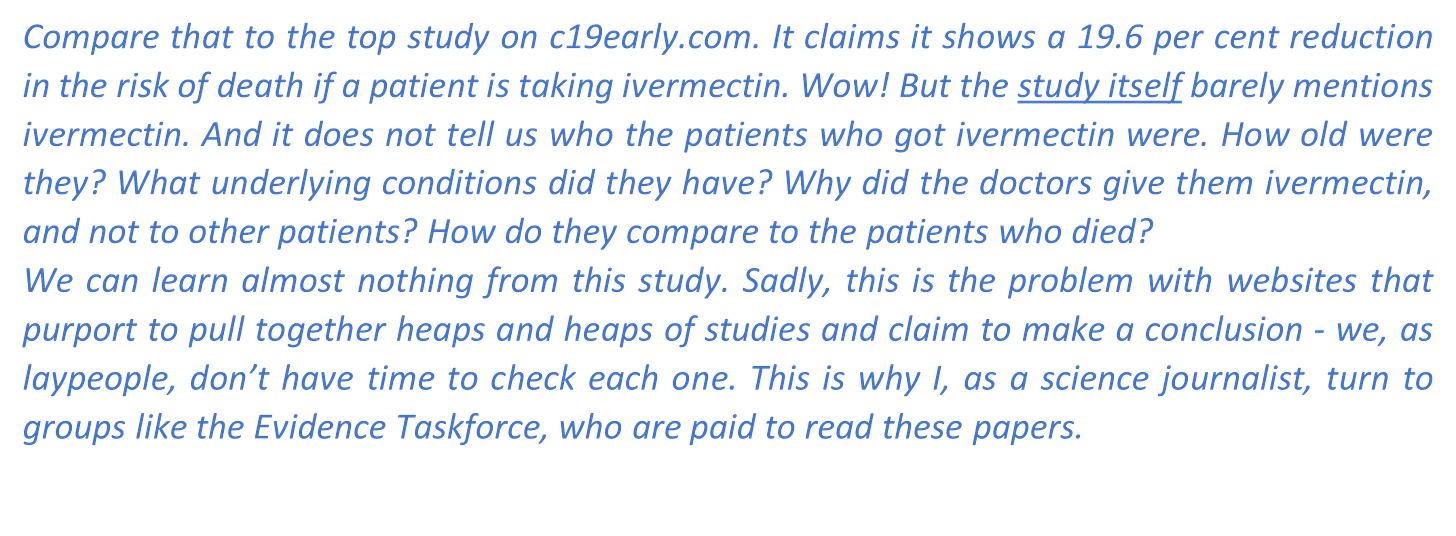The Gross Misapplication of Evidentiary Standards
How the rigid formulas of evidentiary assessment defy common sense and corrupt science
Dr. Pierre Kory himself strongly endorsed this article on one of the FLCCC weekly zoom meetings.
Someone recently sent me an article entitled Ivermectin, COVID-19, and making sense of scientific evidence, by science writer Liam Mannix. The central goal of the article is to provide a framework for analyzing scientific evidence - namely studies – and Mannix of course concludes that the evidence base for Ivermectin is essentially a collection of unreliable and corrupted studies/trials. This article is well written, and superficially comes across as incredibly convincing and tightly argued, a lethal combination for a propaganda piece. (The lack of malicious intent by the author does not change the objective character of his article.) Additionally, I think that this article succeeds in articulating the central epistemological axioms of the mainstream academic community (at least for the portion that are still fundamentally intellectually honest), which provides the opportunity to rebut the entire edifice underlying their methodology for determining factual truth, specifically regarding assessing the reliability of source material/data/studies.
One note before we begin: obviously, there are some premises that I am assuming are true a priori, such as the endemic corruption of the scientific community to some degree, that Liam Mannix would not grant whatsoever. However, the primary purpose in writing this response is to provide rational people with an explanation of how those of us who are staunchly and unreservedly pro-Ivermectin understand the evidence base.
Below is a paragraph-by-paragraph rebuttal of the entire article.
I want to interject here that the assertion that “nearly all the evidence on Ivermectin has been of such low quality etc” is categorically false. This will be dealt with along the way.
A Cochrane review is not some magical method for determining absolute truth that is free from human judgement, which is the only truly pertinent fact here, because anything subject to human judgement is by definition subject to human error, and corruption. A Cochrane review essentially is a collection of standards and tests dictating the quality and quantity of evidentiary value assigned to a data point or collection based on characteristics such as the source’s size, sampling, biases, protocols, and so on. It also provides a series of statistical methodologies by which one can assign a value to data or data sets, and combine data from different sources.
There are at least two glaring flaws in this model:
1. Ultimately, the application of Cochrane standards relies upon the research capacity and integrity of whomever is performing the review, meaning that the failure of the reviewer to accurately document pertinent characteristics will compromise the results. To take an obvious but extreme example, suppose an RCT was fraudulently conducted but written up in a manner that successfully eliminates any trace of the fraudulent activity? Again, to pick an absurd illustration, suppose they swapped the drug being tested with a placebo in an attempt to ensure that the trial fails to observe a benefit in the tested drug. Obviously, a reviewer’s ignorance of this will lead him to categorize the study as high-certainty evidence per the Cochrane review standards.
2. Cochrane reviews stipulate a hierarchy of evidence that while (let’s assume is) generally able to accurately capture the effect’s significance and certainty, it does so by assigning values to characteristics that are often situationally unwarranted. This method therefore can sometimes falsely portray evidence as either weaker or stronger than it is. The prime example of this is probably the consideration of RCT’s as the ultimate “gold-standard” of studies, but there are plenty of other assumptions by the Cochrane standards that are somewhat unsound. To put this more succinctly: any formal, rigid formula used to assess something by definition lacks the flexibility to cope with situations where the available evidence will not conform to the exacting specifications demanded by the Cochrane standards, even though the evidence might be obviously convincing and demonstrative to anyone with common sense.
These flaws, when combined with broad systemic corruption in the scientific community, result in a cult-like insistence of ignoring an avalanche of real-world experience & evidence in favor of following the officially prescribed method of evidence assessment, which is what has occurred regarding Ivermectin. Here is a “theoretical” example to illustrate this: Suppose there was a pandemic where the world was caught flat-footed. Doctors and scientists scrambling to find an effective treatment rapidly began testing different drugs to see if any seemed to be of help. Harried doctors on the front lines, noticing a potential signal of a potential drug that might be efficacious, quickly organize ad hoc trials, where they essentially give a group of people, usually either health care workers or patients, the option to take or refuse the new drug. These trials show insanely huge reduction in mortality, disease severity and prophylaxis. As word starts to spread around the world, a few countries engage in mass distribution of this drug to a substantial portion, or all, of their population, with a reproducible tight correlation between mass distribution and near eradication of the pandemic virus. None of the evidence in this “hypothetical” would be acknowledged by a formal, proper Cochrane review, because these are either “low quality” studies, or determined and judged to be nullities, due to lack of adequate procedural controls, proper pre-registration, and similar technical specifications that dotted all the “i’s” and crossed all the “T’s”. Thus the phenomenon of meta-analyses claiming to survey the entire evidence base that somehow omit most of the studies from the meta-analysis of “all” the evidence.
With that introduction, let’s turn to the substance of this article. The author comically claims that being empaneled by a government is somehow a positive attribute vis-à-vis adjudicating the panel’s credibility regarding a controversial political topic. A govt panel is controlled by the govt, either directly or indirectly via some combination of legal, social, financial, and professional peer pressures, usually all of the above. Thus, you can be sure that the governments wishes and priorities will not be lightly disregarded.
Next, he claims that such scientists are “independent”. The virtue of independence is meant to say that the scientist is unencumbered by any external influences in executing his scientific analyses. The most powerful corrupting influence currently present emanates from the scientific community itself. Thus, unless a scientist is demonstrably acting independently of the scientific establishment (at minimum), he is presumed to be not independent of the crushing peer/social/govt pressure, as is the case here, where in addition to the default scientific community pressure, as mentioned earlier, the govt itself constituted the panel.
That the panel rejected a drug purchased by the govt as a potential useful treatment is wholly irrelevant, because there is no political cost to having purchased a drug, even for a sizable cost, that maybe could have worked out, as the citizenry (especially one already whipped into a panicked frenzy) would tend to appreciate that the govt is acting so proactively and therefore not feel as though the govt had acted irresponsibly. In any event, absurd and unreasonable govt expenditures are a common and routine phenomenon that does not excite the passion or provoke the ire of the population.
Ivermectin, on the other hand, is politically charged dynamite, as anyone remotely familiar with the current political climate and discourse surrounding Ivermectin readily appreciates.
Representation from across the medical spectrum is likewise irrelevant because the medical establishment itself is a primary corrupting influence on the scientific process, and everyone working under the aegis of the govt is equally subject to the corrupting whims and diktats of the politicians and bureaucrats who wield its powers. This claim is ultimately useful only insofar as representative of the delusional naivete of the author.
Unfortunately, anonymity is necessary to protect dissenting scientists or doctors from career/professional assassination at the hands of their colleagues, govt and/or the media, so it does not inherently indicate anything, as both legitimate and illegitimate actors would act anonymously.
Their work, however, speaks for itself. Even more compelling are the genuine world-class medical pioneers who are the driving academic force behind the Ivermectin campaign, who hold this website and its creators in high esteem.
In any event, this attack is not only dumb, it’s akin to attributing special relativity to some middling college physics professor while ignoring Einstein and claiming that the primary authority behind the theory is the no-name professor. The FLCCC, comprised of unimpeachably credentialed brilliant medical luminaries, presents a thorough overview and analysis of the evidence base and protocols for Ivermectin.
The conundrum posed by the author is in truth a question of which experts should you trust: a govt empaneled committee who are essentially analyzing from comfortable perches in their ivory towers, who face no real threat of sanction for denying Ivermectin’s efficacy but face very real professional perils should they buck the medical/scientific/govt establishment, or a group of brilliant doctors who have put their careers, social lives and reputations on the line while successfully using Ivermectin for a year and treated tens of thousands of patients directly and consulted for doctors worldwide who have collectively treated millions. Not much of a choice when you frame it honestly and accurately.
If you look at their references for their Ivermectin research, you will find cited Lopez-Medina et al. This study literally engaged in deliberate scientific fraud. A panel dedicated specifically and solely to grading quality of evidence that cites an obviously fraudulent study lacks even a semblance of credibility. Period. There reference list is highly problematic for other the inclusion of other dubious references while omitting perfectly acceptable studies that were far less problematic procedurally than some of those included. Like Lopez-Medina. (At least they aren’t citing the Roman et al meta-analysis, which simply lied about the results of some of the studies whose results they were allegedly analyzing.) The FLCCC doctors, in a few of their weekly updates, explained the ins and outs of some of the ridiculous anti- studies. You can listen to an explanation of the evidence base from (formerly?) world-renown FLCCC President Dr. Pierre Kory here, and from expert WHO consultant Dr. Tess Lawrie here.
So the author conveniently ignores every anti-Ivermectin garbage study (probably because the author is blissfully unaware that they are junk science; more on this later). Worse, he cites the surgisphere fiasco, where the world’s most prestigious journal published a “peer-reviewed” study whose data was never reviewed at all (and was quite literally fabricated out of thin air), and had enough red flags to paralyze a rampaging bull with joy. A word of advice to Mr. Mannix, invoking the Surgisphere fraud while certainly entertaining is ill advised for reasons that should be unnecessary to elaborate upon. Suffice it to say that it would seem difficult to instill confidence in the scientific establishment by irrefutably proving the entanglement and corruption by political considerations of the peer-review and editorial processes. The Elgazzi Egyptian study that was retracted following serious allegations of fraud was withdrawn by the pre-print server without affording its lead author the chance to respond to the allegations, and who Dr. Kory said recently is disputing these accusations as manipulative and false, so the jury is still out on this one.
Like the journal that published the aforementioned unmitigated Surgisphere fraud. Points for sophisticated discernment?
In any event, this argument is rubbish, because one of the cornerstones of the current debate is the medical community’s censorship of dissenting opinions from mainstream journals and publications. Obviously, if the top journals simply refuse to publish any papers that would place the political narrative in serious jeopardy, you cannot adjudicate the credibility of a paper by where its published (or more to the point, where it is not published). A more viable approach to assess the credibility of a study by its provenance is to look at the authors – if they are highly credentialed and mainstream according to a Google search starting from before March 2020 who are not conforming to the establishment narratives, then they carry far more weight than those who do not meet these criteria. Ultimately, there is no substitute for sensible judgement, which is an intangible quality that some people have and some people don’t.
This is functionally illiterate. A number of small trials all showing the same result is itself extremely high-powered evidence, because the chance of running, say, 30 independent trials with widely ranging characteristics and observing the same results are so infinitesimal as to be negligible. 25 small, individually underpowered studies are far more conclusive than one large trial, because while 25 trials with widely ranging characteristics can largely negate each other’s (potential) biases, one large study cannot overcome its own design flaws. (Yes, RCT’s can be designed quite horrifically while following every rule and standard, something which cannot be emphasized enough.) This is emphatically the case regarding Ivermectin, although you would have to look at the individual studies to get a sense of this, which the very website this author maliciously attacks provides, ie lists all of the studies with a summary of the basic results intelligible to a layperson.
This is rather ironic, as the Dexamethasone arm of the trial was designed so poorly that the FLCCC doctors were scared that it would show negative results (such as extremely low dosing. I don’t remember all of the other criticisms off the top of my head but there were others mentioned in one of the weekly FLCCC updates. And yes, I imagine that readers who are disinclined to accept my positions will blow a casket because of my consistent reliance on the FLCCC docs). This trial also led to the official codification and subsequent mindless adoption of the precise regiment of the trial – exact same ridiculously low dose first utilized at a later stage of the runaway inflammation than was reasonable to wait for, only Dexamethasone but no other steroids, etc – the FLCCC docs discovered long ago, for instance, that the steroid methylprednisolone was a noticeably superior alternative and at much higher doses. And a recent study by Dr. Robert Malone indicated that NSAID’s may be superior to steroids.
As to the parenthetically enclosed observation, this is again ridiculous naivete. When was the last time you heard of mass distribution of Dexamethasone?? Exactly. Dexamethasone’s efficacy, especially at the comically under-dosing tested by the Oxford trial, is not exactly anything stupendous. The reason that Big Pharma has no problem with Dexamethasone is that Dexamethasone does not pose a threat to the viability of vaccines or expensive anti-virals, since it is a mildly effective treatment only available in hospitals as a late stage intervention. Daniel Horowitz (Blaze) has done a spectacular job documenting the establishment’s war on effective treatments.
C19early.com is a compilation of every study for Ivermectin (and other treatments), ranked chronologically from most recently published. They include every study run, regardless of the results, and regardless of the statistical significance. (They still have up the fraudulent Lopez-Medina and Roman studies.) Their list is not designed to filter out low quality garbage. This author is being ridiculous, a competent person easily understands the nature and purposes of the website, and would use a little, you know, judgement and certainly not cherry pick the first study as representative. Furthermore, a number of low-quality studies taken together provides quite robust evidence in sufficient numbers, because, as previously stated, the odds of practically all the studies show efficacy if there wasn’t any are so remote as to be absurd speculation. Furthermore, there is a marked tendency to label any study that was run somewhat haphazardly as entirely devoid of any evidentiary value. This is, to put bluntly, moronic and disingenuous. Someone treating ill covid patients doesn’t have time to properly randomize sorting into evenly propensity score matched groups and all of the other minutiae necessary to run a “proper” RCT for a disease that will either start recovery or turn towards ventilation (or death) within a week or two. Furthermore, delaying the start of treatment in any event increases the risk that treatment will not be effective, which is both highly unethical and reduces the chance of seeing a statistically significant result especially when you have a low study subject population to begin with.
As if we needed Mr. Linnix to expose his complete illiteracy any further. . .
Mr. Meyerowitz-Katz, for the record, is at best just another typical scientist mindlessly toting the virtues of the official academic processes. Anyway, this is no “masterpiece of science”. This is a pathetically designed trial so brutally horrific that the BIRD group penned a letter where they characterized the trial design as dreadful to the point that deliberate malfeasance could be indicated.
Conclusion:
The Ivermectin evidence base, ranked in order of quality (ie, most improbable results if Ivermectin doesn't work), is essentially:
1. The clinical experience of thousands of doctors worldwide successfully treating patients with Ivermectin & Ivermectin centered protocols. This includes a spate of court cases where judges ordered hospitals to administer (or not impede administration of by 3rd party physician of) Ivermectin to already ventilated patients for whom their hospital had no other treatments to offer and who all subsequently recovered (with the notable exception of the Mt Sinai case where the patient died amidst the inconsistently administered Ivermectin during the court wrangling).
2. The countries that mass distributed Ivermectin to part or all of their population with tightly correlated and reproducible “flattening the curve” of every covid metric (like Mexico, Peru, India, just to name a few), some of which had a control group of an untreated population or subsequent change of policy.
3. The numerous prospective control trials, both random and unrandom, showing Ivermectin’s brilliant efficacy. I personally think that Carvallo et al, which was an unrandom control prospective prophylaxis study (the subjects chose whether to accept Ivermectin by choice), is the most compelling – 237/400 or so in the control contracted covid vs 0/788 on Ivermectin – ZERO!! – a result so lopsided and stunning that cannot possibly be chalked up to chance, biases or any other nonsensical pathetic attempt to invalidate the study.
4. The small, individually underpowered retrospective observation trials.
5. In-vitro/in-silico demonstrations of Ivermectin wiping out covid, and everything else not mentioned above.
The Cochrane standards reject #1 outright, severely undervalue #2 because they are lacking one or more technical requirements, assign “low weight” qualification to almost all of the studies in #3 for not following proper academic protocol or for “risk of biases”, and basically exclude # 4 entirely as “noise”; while simultaneously incorporating straight up fraudulent studies like Lopez-Medina, poorly designed studies that dose too low, treat too late, use a demographic that already widely uses Ivermectin, and meta-analyses that are rigged by excluding all of the above while including all the aforementioned poorly designed junk studies, and have no mechanism for assessing the political corruption of the academic process. I think that sums it up quite nicely.














